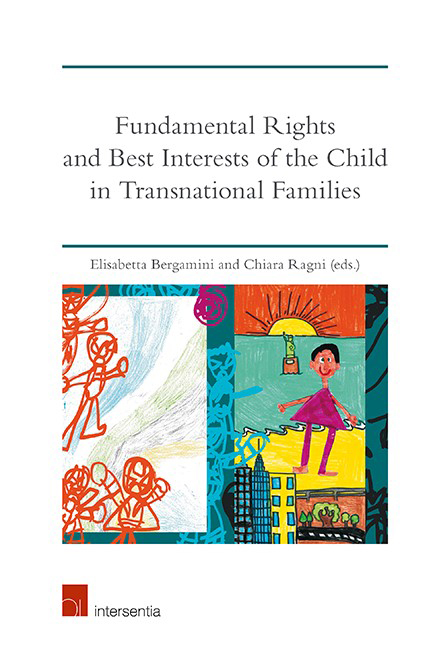Book contents
- Frontmatter
- Dedication
- Preface
- Acknowledgements
- Contents
- List of Cases
- List of Authors
- PART I THE IMPACT OF HUMAN RIGHTS AND OF THE BEST INTERESTS OF THE CHILD ON EU FREE MOVEMENT AND MIGRATION LAW
- PART II THE BEST INTERESTS OF THE CHILD AS A CONCERN OF HUMAN RIGHTS AND EUROPEAN PRIVATE INTERNATIONAL LAW
- The Place of Human Rights in the Private International Law of the Union in Family Matters
- The Best Interests of the Child Principle at the Intersection of Private International Law and Human Rights
- Recognition of a Foreign Status Filii: Pursuing the Best Interests Principle
- Surrogacy Arrangements and the Best Interests of the Child: The Case Law of the European Court of Human Rights
- Cross-Border Recognition of Adoption: Rethinking Private International Law from a Human Rights Perspective
- Protecting Children's Rights aft er Child Abduction: The Interaction of the CJEU and ECtHR in Interpreting Brussels II bis
- Cross-Border Parental Child Abduction in the EU: Is there Room for a Human Rights Exception?
- Impact of the Best Interests of the Child on the Brussels II ter Regulation
- Provisional Measures and the Best Interests of the Child in the Field of Parental Responsibility
- Index
- About the Editors
The Place of Human Rights in the Private International Law of the Union in Family Matters
from PART II - THE BEST INTERESTS OF THE CHILD AS A CONCERN OF HUMAN RIGHTS AND EUROPEAN PRIVATE INTERNATIONAL LAW
Published online by Cambridge University Press: 12 November 2019
- Frontmatter
- Dedication
- Preface
- Acknowledgements
- Contents
- List of Cases
- List of Authors
- PART I THE IMPACT OF HUMAN RIGHTS AND OF THE BEST INTERESTS OF THE CHILD ON EU FREE MOVEMENT AND MIGRATION LAW
- PART II THE BEST INTERESTS OF THE CHILD AS A CONCERN OF HUMAN RIGHTS AND EUROPEAN PRIVATE INTERNATIONAL LAW
- The Place of Human Rights in the Private International Law of the Union in Family Matters
- The Best Interests of the Child Principle at the Intersection of Private International Law and Human Rights
- Recognition of a Foreign Status Filii: Pursuing the Best Interests Principle
- Surrogacy Arrangements and the Best Interests of the Child: The Case Law of the European Court of Human Rights
- Cross-Border Recognition of Adoption: Rethinking Private International Law from a Human Rights Perspective
- Protecting Children's Rights aft er Child Abduction: The Interaction of the CJEU and ECtHR in Interpreting Brussels II bis
- Cross-Border Parental Child Abduction in the EU: Is there Room for a Human Rights Exception?
- Impact of the Best Interests of the Child on the Brussels II ter Regulation
- Provisional Measures and the Best Interests of the Child in the Field of Parental Responsibility
- Index
- About the Editors
Summary
THE PROTECTION OF FUNDAMENTAL RIGHTS IN THE UNION ‘S LEGAL SYSTEM
ARTICLE 6 OF THE TREATY ON EUROPEAN UNION AND OTHER SOURCES
Article 6(1) of the Treaty on European Union states that the Union recognises the rights set out in the Charter of Fundamental Rights of the European Union (CFREU), the legal value of which is the same as that of the Treaties. Article 6(3) further provides that fundamental rights, as guaranteed by the ECHR and as they result from constitutional traditions common to Member States, constitute general principles of the Union's law. The Union is thus committed to promoting the realisation of fundamental rights in any field where its action unfolds. This means that measures adopted by institutions are only consistent with primary law if they comply with the applicable human rights standards.
References to human rights can be found in other provisions of the TEU, as well. Article 2 lists the respect for fundamental rights among the founding values of the Union. According to Article 3(3), the Union's aims include the promotion of ‘equality between women and men’ and the ‘protection of the rights of the child’. Article 21(1) makes clear that the Union's action on the international scene is guided by, among others, the principles of ‘universality and indivisibility of human rights and fundamental freedoms’ and ‘respect for human dignity’.
The Union's duty to protect fundamental human rights also rests on international conventions to which the Union itself is a party, like the United Nations Convention of 13 December 2006 on the rights of persons with disabilities. Based on Article 216(2) of the TFEU, international conventions that bind the Union on the international plane further serve as a yardstick for assessing the validity of secondary legislation.
Other international conventions, although not binding as such on the Union, play a role in the protection of fundamental rights within the Union's legal system. This holds true, inter alia, for the United Nations Convention on the Rights of the Child of 20 November 1989 (UNCRC), which is in force for all Member States. Some of its rules are believed to reflect international customary law, which the Union is under an obligation to respect.
- Type
- Chapter
- Information
- Publisher: IntersentiaPrint publication year: 2019

